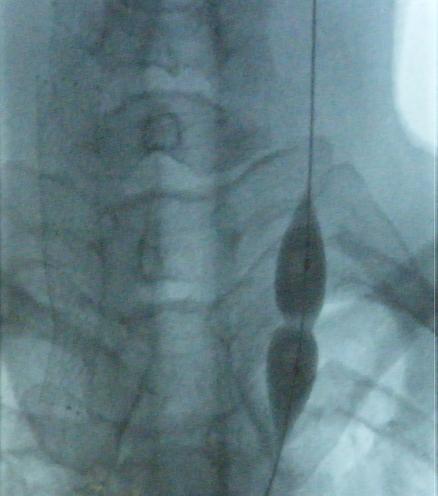Balloon dialatation of a stenosed jugular vein, the “liberation procedure” promoted as a treatment for CCSVI and multiple sclerosis.
You are not going to change what we do, you’re not going to change our determination to make these patients better. I see these patients, I know these patients, I value these patients, I’ve looked after them for years. I’ve seen them after the procedure, the vast majority are improved.
The above quote could be a reference to just about any fringe medical treatment. It is partly an expression of faith in anecdotal experience over scientific evidence. It is partly the fallacy of justifying a treatment because it is needed – whereas the real question is whether or not the treatment works. It is an attempt to justify specific claims with compassion, as if the person quoted cares more for the health of their patients than those who might be skeptical of their claims. And it is an expression of stubbornness – I know the truth, so don’t confuse me with evidence and logic.
Is this person talking about acupuncture? Perhaps they run a stem cell clinic in China, India or somewhere outside the reach of regulation. Or maybe they are defending hyperbaric oxygen therapy for unproven indications, like autism. It could be anything, because this sentiment is the standard mantra of the dubious practitioner, practicing outside the bounds of science-based medicine.
The quote is from Dr. Tom Gilhooly, a GP who runs Essential Health, a clinic in the UK that offers the liberation procedure for presumed CCSVI (chronic cerebrospinal venous insufficiency). Gilhooly is defending his practice to the BBC, after a healthy investigator, Sam Smith, presented to his clinic and paid to have a screening procedure performed – which diagnosed her with CCSVI.
CCSVI, multiple sclerosis, and the science
I wrote about CCSVI last year – is a controversial claim by vascular surgeon Dr. Paolo Zamboni, who believes that multiple sclerosis (MS) is caused by venous insufficiency in the brain. The liberation procedure uses balloons to open up the allegedly blocked veins, and in some cases stents are place to keep the veins open. Since my last reporting there have been several more attempts to replicate Zamboni’s research – all negative. This study compares MS patients to patients with other neurological disease and healthy controls, and found no significant difference in the prevalence of signs of venous insufficiency. Another study found that venous pressure is not different in MS patients vs normal controls. Yet another study found a lack of association between CCSVI and HLA DRB1*1501 in MS patients, which is a genetic variant that carries an increased risk of developing MS.
The bottom line is that, so far, it is not looking good for CCSVI being a real disorder that is associated with, let alone a major cause of, MS.
Further – there is no clinical data (other than anecdotes) to demonstrate that the liberation procedure is a safe and effective treatment for any subtype of MS. But the claims for the treatment are dramatic, there is impressive-sounding anecdotal evidence of benefit (because there always is – no matter what the alleged treatment), and in many patients MS is a debilitating and progressive disease that does not always respond to treatment. In other words, there are desperate patients out there, and the combination of desperation and dramatic claims leads to people seeking treatment, despite the lack of scientific evidence.
These situations require thoughtful regulation in order to ensure that patients are not exploited (even by well-meaning practitioners, and we certainly cannot assume that everyone offering an expensive treatment is going to be well-meaning). The system needs to allow for some flexibility within the standard of care, and certainly for experimentation to advance the science of medicine. But this has to be balanced with the needs of informed consent and ethical practice and research.
This can be a difficult balance to strike. But as some countries are struggling to achieve the optimal balance of freedom and protection at the edge of scientific knowledge, medical tourism is undercutting such efforts.
The BBC reports, for example, that while the NHS does not cover the liberation procedure, thousands of patients have already gone overseas to have the procedure. There are reports of at least two deaths from the procedure, so it is not without its risks.
Conclusion: Enthusiasm is outpacing the evidence
Clearly, use and demand for the liberation procedure has raced ahead of the evidence, which is mostly negative. More research is needed to put this claim to bed, or perhaps discover a more limited role for this syndrome and its treatments. But there is certainly an insufficient basis to offer the procedure outside of an ethically designed and executed clinical trial.
This is not an isolated example, nor is it even the worst example. Stem cell tourism appears to be a much greater problem, with patients (victims) spending tens or hundreds of thousands of dollars to fly around the world to get unknown cocktails (claimed stem cells) injected into them without any reasonable expectation of benefit, but with clear risks.
We are seeing the globalization of high-tech quackery. Current regulatory systems are not designed to address this problem. All we can do is ask countries in which these clinics thrive to crack down, but there is a reason why such clinics are set up in these countries to begin with.
Meanwhile we can educate the public, and potential victims, about the evidence and the dangers. But information is often impotent against the power of desperation.

